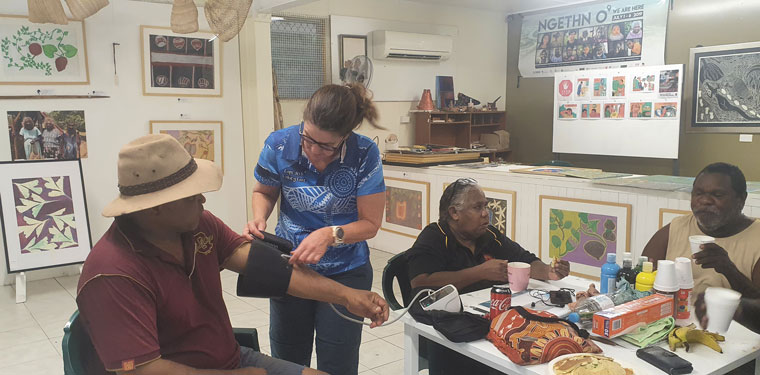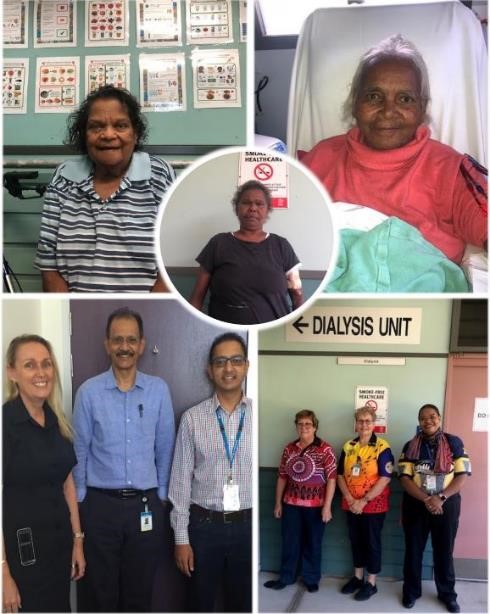Did you know that kidney disease can affect people at any age or stage of life. Just over 1 in 10 or around 500,000 Queensland adults are estimated to have at least one sign of this chronic disease.
Today marks the beginning of Kidney Health Week which leads up to World Kidney Day on Thursday. This year’s theme is Kidney health for all, which is a timely reminder for us to celebrate some of the most successful services and models across Queensland that are helping to improve outcomes for their patients.
Founded in 2018, the Advancing Kidney Care 2026 Collaborative (AKC2026) is focused on supporting state efforts and resources to improve access to kidney services locally and kidney health for all Queenslanders. “AKC2026 was set-up to implement the Advancing Kidney Care 2026 Plan, however our work to date has gone far beyond that,” said Collaborative chair Lisa Davies-Jones. “The team has built meaningful relationships with services across the state, offering advice and support to fund and design the right services, for the right communities, including provision of kidney care closer to home.”
AKC2026 also works in close partnership with the Statewide Renal Clinical Network as the peak statewide body representing multidisciplinary kidney clinicians in Queensland. To date, the Collaborative has facilitated the allocation of over $51.6M additional funding for Queensland kidney services, supporting over 60 projects.
Some exemplar models that are helping to deliver ‘kidney health for all’ are outlined below.
A new model of care improving access to tertiary chronic kidney disease care in the Western Cape.
A new model being implemented by the Torres and Cape Hospital and Health Service is helping to improve access to tertiary level kidney services for remote Indigenous communities of the Western Cape in Far North Queensland.
Chronic disease, including chronic kidney disease (CKD), is a major health burden for Aboriginal and Torres Strait Islander people, with many experiencing difficulties attending specialist clinics because of travel required for in-person appointments, transportation, or cultural and community expectations.
The Cape York Kidney Care (CYKC) model commenced in mid-2019 with recurrent funding facilitated by Advancing Kidney Care 2026. The model includes the use of face-to-face clinical services on county, telehealth, a multidisciplinary approach with tertiary centres, and the delivery of kidney care to all the people of the Western Cape who are known to have CKD. The service uses a rural generalist with advanced skills and a dedicated renal nurse practitioner.

Pictured above: CKD Nurse Practitioner Dr Leanne Brown with Kowanyama residents Fitzgerald Raymond, Noeline Cecil and David Raymond.
Providing haemodialysis in community during COVID-19: supporting the people of Yarrabah
Yarrabah is a small town with a population of approximately 2,600 people, an hours’ drive south east of Cairns. In mid-2020 and in response to the COVID19 outbreak the Federal Minister for Health implemented strict travel restrictions applying to designated Aboriginal and Torres Strait Islander Communities. These restrictions had the potential to impact both life and access to haemodialysis (HD) for the eight Yarrabah residents who then travelled to access HD in Cairns.
“The renal team emphatically felt that being displaced from community and family would have significant effect on the wellbeing of their clients and efforts needed to be made to avoid this wherever possible” Luke Croker, Nursing Director, Cairns and Hinterland HHS.
In response the Cairns renal team, in collaboration with the Yarrabah local government and Human Biosecurity Officer, implemented a solution enabling staff to travel into community, rapidly adjusted working arrangements so all Yarrabah dialysis patients could remain in community.
Yarrabah dialysis patients have said that this support over COVID19 “minimised travel time and [gave] comfort in a familiar surrounding” and “dialysing in [my] community lets us live closer to a normal life”.
In addition, AKC2026 and Statewide Renal Clinical Network supported Children's Health Queensland's Child and Adolescent Renal Service to develop a guide to support young people and their families in the transition from the Queensland Children’s Hospital (QCH) kidney service to adult kidney health care.

Pictured above: (clockwise from top left) patients Maude Hastie, Jennifeer Miller, Mina Andrew; Yarrabah dialysis unit staff Robyn Wise, Deslie Dempsey and Katherine Mairu; Yarrabah clinical leads Fred Griffiths, Dr Murty Mantha, Dr Shyam Dheda
Their documentary Anthony’s Story was also named as a finalist for the 2022 International Society of Nephrology (ISN) Film Community Best Film hosted at the ISN World Congress this week.
For more information about Advancing Kidney Care 2026, visit the Advancing Kidney Care 2026 website or email AKC2026Collaborative@health.qld.gov.au.
For more information about the Statewide Renal Clinical Network, visit the Statewide Renal Clinical Network website or email statewide_renal_network@health.qld.gov.au .